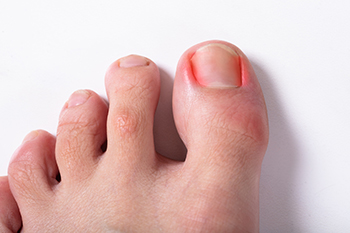
There are various reasons an ingrown toenail can develop. This painful foot condition is defined as the toenail growing into the skin instead of over it. Common reasons for an ingrown toenail to develop are trimming the toenails incorrectly, and wearing shoes that do not fit properly. Additionally, it may happen from having an abnormal foot structure, genetic reasons, or if a toe injury has occurred. Temporary relief may come from soaking the affected foot in warm water, followed by using a small piece of cotton to separate the nail from the skin. It can also help to wear wider shoes that can accommodate the affected toe, and the pain may be eased by taking over-the-counter medication. Permanent relief can be found when a podiatrist is contacted, who can perform minor surgery to correct this condition. If you have developed an ingrown toenail, it is strongly suggested that you speak to this type of doctor who can offer you treatment options that are best for you.
Ingrown toenails may initially present themselves as a minor discomfort, but they may progress into an infection in the skin without proper treatment. For more information about ingrown toenails, contact one of our podiatrists of Parkwood Podiatry. Our doctors can provide the care you need to keep you pain-free and on your feet.
Ingrown Toenails
Ingrown toenails are caused when the corner or side of a toenail grows into the soft flesh surrounding it. They often result in redness, swelling, pain, and in some cases, infection. This condition typically affects the big toe and may recur if it is not treated properly.
Causes
- Improper toenail trimming
- Genetics
- Improper shoe fitting
- Injury from pedicures or nail picking
- Abnormal gait
- Poor hygiene
You are more likely to develop an ingrown toenail if you are obese, have diabetes, arthritis, or have any fungal infection in your nails. Additionally, people who have foot or toe deformities are at a higher risk of developing an ingrown toenail.
Symptoms
Some symptoms of ingrown toenails are redness, swelling, and pain. In rare cases, there may be a yellowish drainage coming from the nail.
Treatment
Ignoring an ingrown toenail can have serious complications. Infections of the nail border can progress to a deeper soft-tissue infection, which can then turn into a bone infection. You should always speak with your podiatrist if you suspect you have an ingrown toenail, especially if you have diabetes or poor circulation.
If you have any questions, please feel free to contact our offices located in Brunswick and Hinesville, GA . We offer the newest diagnostic and treatment technologies for all your foot care needs.
